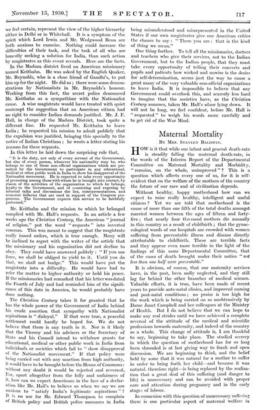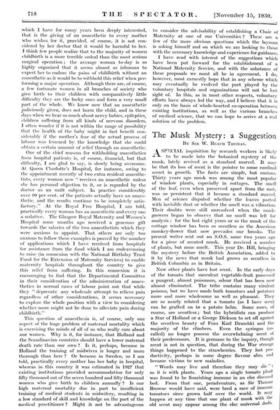Maternal Mortality
By MRS. STANLEY BALDWIN.
HOW is it that while our infant and general death-rate is steadily falling the maternal death-rate, in the words of the Interim Report of the Departmental Committee on Maternal Mortality and Morbidity, " remains, on the whole, unimproved " ? This is a question which affects every one of us, for it is self- evident that on the welfare of the mothers of the country the future of our race and of civilization depends.
Without healthy, happy motherhood how can we expect to raise really healthy, intelligent and useful citizens ? Yet we are told that motherhood is the cause of more than one fifth of the total deaths amongst married women between the ages of fifteen and forty- five ; that nearly four thousand mothers die annually in this country as a result of childbirth ; that the gynae- cological wards of our hospitals are crowded with women suffering from preventable illness and disease directly attributable to childbirth. These are terrible facts and they appear even more terrible in the light of the findings of this same Departmental Committee, that of the cases of death brought under their notice " not less than one half were preventable."
It is obvious, of course, that our maternity services have, in the past, been sadly neglected, and they still lag far behind the other branches of medical science. Valuable efforts, it is true, have been made of recent years to provide ante-natal clinics, and improved nursing and post-natal conditions ; no praise is too high for the work which is being carried on so unobtrusively by Dame Janet Campbell and her colleagues at the Ministry of Health. But I do not believe that we can hope to make any real strides until we have achieved a complete reversal of the attitude of the medical and scientific professions towards maternity, and indeed of the country as a whole. This change of attitude is, I am thankful to say, beginning to take place. The studied secrecy in which the question of motherhood has for so long been shrouded is at last giving way to frank and open discussion. We are beginning to think, and the belief held by some that it was natural for a mother to suffer in order to bring forth her child—and because it was natural, therefore right—is being replaced by the realiza- tion that a great deal of this suffering (and danger to life) is unnecessary and can be avoided with proper' care and attention during pregnancy and in the early stages of labour.
In connexion with this question of unnecessary suffering there is one particular aspect of maternal welfare in which I have for many years been deeply interested, that is the giving of an anaesthetic to every mother who wishes , for it, provided, of course, it is not con- sidered by her doctor that it would be harmful to her.
I think few people realize that to the majority of women childbirth is a more terrible ordeal than the most serious surgical operation ; the average woman to-day is so highly organized that it seems almost as inhuman to expect her to endure the pains of childbirth without an anaesthetic as it would be to withhold this relief when per- forming a major operation. Although there are, of course, a few fortunate women in all branches of society who give birth to their children with comparatively little difficulty they are the lucky ones and form a very small part of the whole. We know now that an anaesthetic judiciously given, does not harm the child, and in these days when we hear so much about nervy babies, epileptics, children suffering from all kinds of nervous disorders, I often wonder if it is not within the range of possibility that the health of the baby might in fact benefit con- siderably if the mother's fear of the actual process of labour was lessened by the knowledge that she could obtain a certain amount of relief through an anaesthetic.
One of the chief reasons for withholding anaesthetics from hospital patients is, of course, financial, but that difficulty, I am glad to say, is slowly being overcome. At Queen Charlotte's Hospital, for instance, owing to the appointment recently of two extra resident anaesthe- tists, every woman now " receives an anaesthetic unless she has personal objection to it, or is regarded by the doctor as an unfit subject. In practice considerably over 90 per cent. of the patients actually have an anaes- thetic, and the results continue to be completely satis- factory." At the Royal Free Hospital, I am told, practically every woman has an anaesthetic and every one a sedative. The Glasgow Royal Maternity and Women's Hospital some months ago received a generous gift towards the salaries of the two anaesthetists which they were anxious to appoint. That others are only too anxious to follow these examples is proved by the number of applications which I have received from hospitals for assistance from the fund which I am endeavouring to raise (in connexion with the National Birthday Trust Fund for the Extension of Maternity Services) to enable maternity hospitals throughout the country to give this relief from suffering. In this connexion it is encouraging to find that the Departmental Committee in their consideration of the administration of anaes- thetics in normal cases of labour point out that while they " deprecate any wholesale attempt to relieve pain regardless of other considerations, it seems necessary to explore the whole position with a view to considering whether more might not be done to alleviate pain during childbirth."
This question of anaesthesia is, of course, only one aspect of the huge problem of maternal mortality which is exercising the minds of all of us who really care about our women. Why is it, for instance, that Holland and the Scandinavian countries should have a lower maternal death rate than our own ? Is it, perhaps, because in Holland the training of midwives is longer and more thorough than here ? Or because in Sweder4 so I am told, practically every mother has her baby in hospital, whereas in this country it was estimated in 1927 that existing institutions provided accommodation for only fifty thousand out of the seven hundred and fifty thousand women who give birth to children annually ? Is our high maternal mortality due in part to insufficient training of medical students in midwifery, resulting in a low standard of skill and knowledge on the part of the Medical practitioner ? Might it not be advantageous to consider the advisability of establishing a Chair of Maternity at one of our Universities ? These are few of the more obvious questions which the layman is asking himself and on which we are looking to those with the necessary knowledge and experience for guidance: I have read with interest of the suggestions which have been put forward for the establishment of a National Maternity Service, and with the substance of these proposals we must all be in agreement. I do, however, most earnestly hope that in any scheme which may eventually be evolved the part played by the voluntary hospitals and organizations will not be lost sight of. In this, as in most other respects, voluntary efforts have always led the way, and I believe that it is only on the basis of whole-hearted co-operation between existing institutions, as well as the various branches of medical science, that we can hope to arrive at a real solution of the problem.









































 Previous page
Previous page